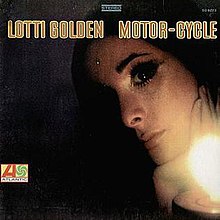Motor-Cycle (album)
| Motor-Cycle | ||||
|---|---|---|---|---|
 |
||||
| Studio album by Lotti Golden | ||||
| Released | May, 1969 | |||
| Recorded | 1968, Atlantic Studios, New York City, New York, United States | |||
| Genre | Rock | |||
| Language | English | |||
| Label | Atlantic | |||
| Producer | Bob Crewe | |||
| Lotti Golden chronology | ||||
|
||||
Motor-Cycle is the debut album by singer-songwriter Lotti Golden released on Atlantic Records in 1969. The album is an autobiographical account of Golden's immersion in the life of New York's East Village, written in music & lyrics because, according to Golden, "a book is too flat.” Motor-Cycle describes the underground world of the late 60's counterculture, “down to the last seconal capsule.”
Newsweek hailed Golden as a new breed of female troubadour—an artist who not only sings, but writes her own songs: "What is common to them -- to Joni Mitchell and Lotti Golden, to Laura Nyro, [and] Melanie... are the personalized songs they write, like voyages of self discovery…startling in the impact of their poetry."
Listed among the most influential albums of the era in The New York Times, "The Best of Rock: A Personal Discography," by music critic Nat Hentoff,Motor-Cycle is a synthesis of stream of consciousness confessional poetry, R&B infused vocals and a "sometimes satiric mélange of rock, jazz, blues and soul" with lyrics that evoke "a Kerouac novel."
Golden's coming of age saga is likely the first rock concept album by a female recording artist. On an album of "restlessly epic roadhouse suites" Golden uses the story-based format, featuring a cast of archetypal characters while playing the part of "emcee" of her own "aberrant cabaret."
Music critic Path, of Tiny Mix Tapes, explains how Motor-Cycle plays like a musical, transporting the listener to the late 60's underground: "Golden gets help on Motor-Cycle from an impeccably arranged Atlantic Records session band… with a flawless, swinging rhythm team. Then, at key moments, the curtain goes up and they've got rows of saxes, trumpets, vibes…and you begin to realize that this is not the same song and dance… it's as if The Velvet Underground recorded for Motown." Golden writes of a "season in hell " she somehow manages to survive. "It's an extraordinary evocation of a life-style… and one girl's plunge into and out of it."
...
Wikipedia
